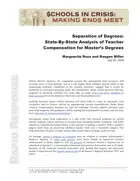School district finances are organized around the assumption that revenues will increase more or less steadily, and at a rate higher than inflation. Recent shifts in the underlying economic conditions of the country, however, suggest that it would be foolhardy to continue operating under this assumption. Many school districts will face stagnant or declining revenues for some time to come, even with large infusions of federal money from the American Recovery and Reinvestment Act.
Looking forward, many school systems will need both to reign in automatic cost escalators, and to finance reform by repurposing current expenditures. Under these criteria, compensation schemes are ripe for redesign: Teacher salaries increase each year with longevity and graduate credits, making them destined to escalate, and yet they have little link to student achievement.
Decoupling salary from experience is a tall order, but forward progress on school reform requires school districts to revamp their spending habits somehow. One habit related to experienced-based salary is the practice of paying a teacher with a master’s degree more than an otherwise identical teacher with only a bachelor’s degree. The long-cherished “master’s bump” makes little sense from a strategic point of view.




